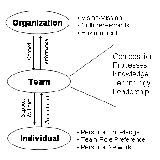Knowledge Management Case Study
Telling Stories to Capture Lessons
This case describes the use of storytelling and related techniques to learn and share lessons from a wide range of projects. This case highlights the value of structured face-to-face workshops in furthering British Council's slogan of "learn, share, connect worldwide".
Organization: British Council, UK
Keywords: project knowledge, storytelling, narrative
Description
The British Council helps to share British expertise worldwide through activities such as cultural exchange, running courses and supporting collaborative science. With some 7,000 people in over 100 countries it is quite a challenge to share knowledge.
The Council's formal knowledge management programme started in December 2002 with the appointment of a director of KM. Over the following year a knowledge audit was conducted and a strategy approved "to deliver excellent services to customers by effectively sharing and utilising our collective knowledge".
Main activities
A number of KM projects were initiated including:
- Working with business units to develop their own KM strategies
- Building cross-departmental Communities of Practice
- Conducting social network analyses to support virtual teams
- Using narratives for project debriefings.
It is this latter activity that is the focus of this case study.
Making Sense of What Happened
The work at British Council built upon Brenda Dervin's theory of sense-making. In this the user's situation is analysed through a dialogue. Typical of the questions asked are:
- What led to this situation?>
- Where did you want to get to?
- What gaps did you see?
- What got in the way?
- What help did you get on the way?
- What emotions did you experience?
- If you had a magic wand what would you like to happen?
Workshops
The Council used an external consultant (David Snowden) helped them run a workshop to learn lessons from a 10-month project to deliver an alternative dispute resolution conference. The objectives of the workshop, held in Dhaka with staff from five countries were to:
- help members reflect
- capture lessons learned
- identify knowledge needed for collaborative working
- identify blockers and enablers of knowledge sharing
- make recommendations for improving similar projects in future.
The workshop used Snowden's storytelling techniques based on the ASHEN model - Artifacts, Skills, Heuristics*, Experience and Natural Talents. The format of the workshop as as follows:
- Reflections - individuals commented in turn on their own team's work
- Sharing experiences - good practices, worse practices, crisis situations were discussed from multiple perspectives
- Decide what knowledge is important to share - five flip chart sheets recorded what was needed for each of the ASHEN perspectives
- Identify the enablers and blockers - for each blocker an enabler had to be suggested
- Wrap-up.
Several useful outputs came from the core part of the workshop - the ASHEN session. In the area of skills, the following were deemed important: listening, time management, lateral thinking, use of chat/ messaging (critical); also negotiation, crisis management, team building, influencing and risk management.
In the area of heuristics, these were some of the outputs: as well as a plan have a backup plan, clearly identify outcomes, ensure equality between countries (critical); also use checklists, check presentations, plan meetings, select participants early, ask questions to improve understanding.
Capturing Narrative
Using a workshop is just one of the techniques used to capture narrative from individuals and groups. In another project interviews (both face-to-face and telephone) were conducted with 30 people. The interviews covered five sets of questions: 1. The situation 2. Help needed 3. Gaps in knowledge 4. The person's role. 5. Reflections and lessons.
The interviews were transcribed and entered as over 500 individual stories into a structured narrative database which which was indexed in several ways - e.g. positive or negative experience, country, sector, theme. Analysis of the narratives identified 14 themes including partnership, processes, planning, strategic, culture, and regional team working.
One of the most useful analyses was comparison of the positives and negatives of each theme. Of the 500 stories around 68% were negative, 23% positive and 9% neutral.
Results
Workshops such as this proved useful but were only part of a wider KM programme. Some reported results were:
- A narrative database that was sent out on a CD to field workers who could search it by different parameters. These insights help them in their day-to-day work
- Certain problem areas were identified - the relevant managers were set targets for improvement
- It identified the need for greater cultural awareness, e.g. country differences
- Managers gained new perspectives on the work of the organization and now appreciate more the need to balance knowledge gained from databases with knowleedge sharing through networking and workshops.
Additional Reading
'Applying Snowden's Narrative Technique to Conduct Project Debriefing within the British Council', B Cheuk, Journal of Information and Knowledge Management, VOl 6, No 1, pp1-8 (2007).
'Applying Sense-Making and Narrative Technqiues to Capture Lessons Learnt', Bonnie Cheuk, Journal of Information and Knowledge Management, Vol 6, No. 3, pp165-171 (2007).
'From The Mind's Eye of the User: The Sense-Making qualitative quantitative methodology', B Dervin in Qualitative Research in Information Management, eds. J. D. Glazier & R. R. Powell, Englewood (1992).
'Team Working at the British Council, InsideKnowledge, Vol. 10, No. 2 (Oct 2006) - covers in detail the use of SNA (Social Network Analysis).
* Heuristics is the use of experience-based techniques for problem-solving, such as a 'rule of thumb'
Comments
Several of the outputs from the workshop would seem to many as 'common sense'. Indeed many KM activities are. It is just that to benefit most from other's knowledge that time must be set aside and structured ways of encouraging sharing, e.g. through workshops and intereviews, are systematically applied.
Knowledge sharing remains at the heart of most of the British Council's day-to-day work. A recent job advert (2010) stated "knowledge management supports effective team working at the local and regional levels".
Last updated: 14th April 2011


